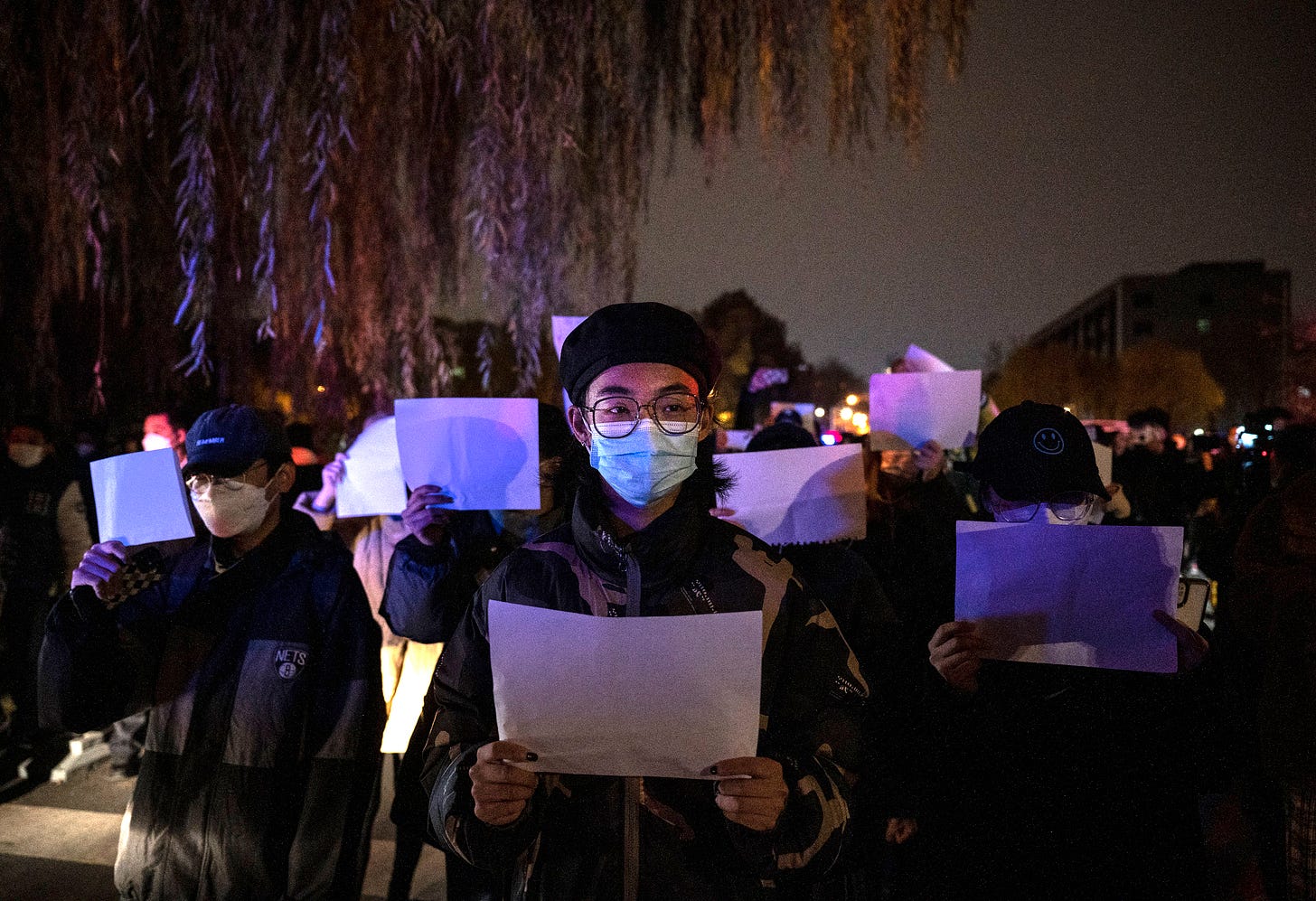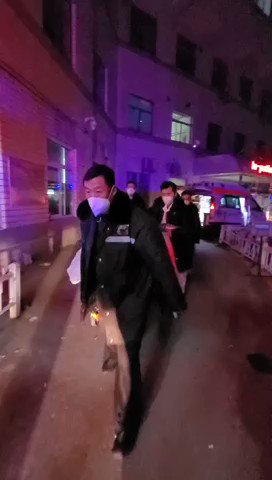For those of you in China exactly one year ago today, I am sure you remember what you did and what went through your mind. Here is my recollection of that fateful day.
Your comments are welcomed.
Wang Xiangwei
27/11/2023
How time flies. It was exactly one year ago today that I flew back to Hong Kong from Beijing and began a new chapter in my life as a journalism professor at Hong Kong Baptist University. But the date of November 27 is always etched in my mind for much more than that reason.
On that cold Sunday when I was packing my bags and anxious to wait for my ride to the Beijing airport, China was in a flux. That was the day when the nationwide protests against China’s zero-Covid policy peaked with students and other ordinary people braving the cold and police presence to be out in the street, waving the white paper and shouting slogans.
Spontaneous protests erupted in major cities one day after a fire in a building in Urumqi of Xinjiang killed 10 people and wounded 9 in a residential area under lockdown. Short videos and images circulating on the social media showed that people blamed the lockdown measures for preventing the firemen from reaching the building in time and expressed anger against the government’s response.
This proved to be the final straw for many mainland residents who were fed up with continuous lockdowns which confined them to their homes and left some unable to buy or receive daily necessities over the past year.
Interestingly, the police largely allowed the protests to continue throughout the weekend until Monday November 28 when they vastly increased the presence and erected barricades in the hot spots and started to disperse protestors.
Meanwhile, I watched the developments with excitement and trepidation. I was excited because I believed the nationwide protests spearheaded by university students could pressure the Chinese leadership to further relax draconian zero-Covid measures.
On 11 November, the Chinese government announced new and detailed guidelines on COVID measures in an attempt to ease the zero-COVID policy including significantly narrowing down the lockdown areas in which new cases were reported.
At the beginning of 2016, I stood aside as the Editor In Chief of the South China Morning Post and returned to Beijing to spend more time with my wife and my daughter.
In the ensuing six years, I was based in Beijing as the Post’s editorial advisor and lived through the entire three years of zero-Covid controls.
https://www.scmp.com/week-asia/opinion/article/3190293/hainans-covid-chaos-exposes-bad-ugly-and-scary-chinas-virus.
At the same time, I was in a state of intense anxiety. Just four days before my flight scheduled on Sunday, we were informed that two new Covid cases were reported in the residential compound where my family lived.
On Thursday morning, residents suddenly discovered the entrance was barricaded with several menacing men dressed in green military coats standing guard and preventing vehicles or people from leaving or entering.
Residents exploded in anger in our Wechat group as some lawyers among the residents argued the lockdown decision clearly breached the November 11 measures which said in case of new Covid cases, the lockdown should only apply to the building in which the patients lived instead of the previous requirement that the entire compound or neighbourhood must be locked down.
But we all knew too well the local enforcement of the central government regulations could vary greatly. A team of negotiators including the lawyers were immediately formed to petition the property management company and the neighbourhood committee which wielded immense power which many would argue without any legal foundation. We argued that since we all lived in standalone houses, the officials should only lock down the house where the family with new cases lived in, in line with the new rules.
To our great surprise, the neighbourhood committee relented, saying that their guards would not prevent people from leaving or entering but they would be stationed there day and night as a show for their superiors.
I was not relieved as I knew those officials could easily change their minds. I was thinking of packing my bags and went to stay at an airport hotel just in case, as a lockdown usually took at least 21 days.
My wife persuaded me to wait and see but I wanted to be prepared. I called my driver and we agreed that he would park close to the compound where I lived if the lockdown occurred on the day of my departure. I would then climb over the wall and went to find him without any bags. I would buy everything I needed when I was in Hong Kong.
Thank goodness, my worst case scenario did not happen and I flew out of Beijing on time.
As soon as I landed in Hong Kong, I felt an immediate sensation of relief and freedom even though the city was also under some Covid controls.
What had happened subsequently was well documented. Three days later on November 30, China’s former leader Jiang Zemin died. Judging by China’s recent history, the sudden death of a top leader could be a catalyst for change, coupled with students protests. One thing led to another, forcing the central government to lift zero-Covid lockdowns early December, much earlier than expected – considering the fact that in much of November, the official state media including the People’s Daily and Xinhua news agency ran back-to-back commentaries, rebuking the calls for the lifting of controls and insisting why zero-Covid policies were good for the people and the country.
But sadly, China’s sudden reopening was a total mess. Beijing had nearly three years to learn from other countries and prepare for reopening but it did not.
Officials tried to give impression that the sudden reopening which occurred in the middle of winter when the respiratory viral infections usually peak, was planned and thought out.
But the reality cannot be more starkly different – fever medicine in short supply, hospitals and emergency services overwhelmed, an acute blood shortage in many cities, death tolls soaring among the elderly, and morgues and funeral parlors overflown with bodies.
Fever meds in short supply, hospitals overwhelmed, blood shortage, death tolls soaring among the elderly, morgues overflown with body bags --Why China has a man-made crisis after "sudden reopening"
Thought of the Day on China Wang XiangweiThanks for reading Wang Xiangwei's Thought of the Day on China! Subscribe for free to receive new posts and support my work. Since China’s sudden U-turn on ending the zero-Covid policies more than two weeks ago, Chinese officials and state media have been struggling to put a positive spin on the decision. They have…
One year later, most people have moved on and remained mostly calm despite the reports of soaring respiratory illness cases in the northern China.
But that fateful day is always etched on my memory.
End




Its good that you left Beijing, though stay away. Continue to write for the SCMP and bury your nose in western narratives. Good move!